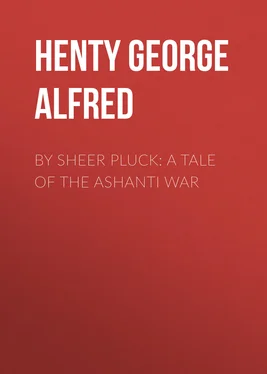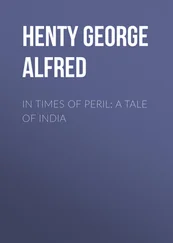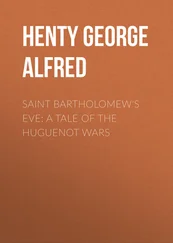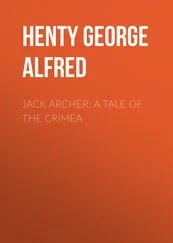George Henty - By Sheer Pluck - A Tale of the Ashanti War
Здесь есть возможность читать онлайн «George Henty - By Sheer Pluck - A Tale of the Ashanti War» — ознакомительный отрывок электронной книги совершенно бесплатно, а после прочтения отрывка купить полную версию. В некоторых случаях можно слушать аудио, скачать через торрент в формате fb2 и присутствует краткое содержание. Жанр: foreign_children, foreign_antique, foreign_prose, на английском языке. Описание произведения, (предисловие) а так же отзывы посетителей доступны на портале библиотеки ЛибКат.
- Название:By Sheer Pluck: A Tale of the Ashanti War
- Автор:
- Жанр:
- Год:неизвестен
- ISBN:нет данных
- Рейтинг книги:5 / 5. Голосов: 1
-
Избранное:Добавить в избранное
- Отзывы:
-
Ваша оценка:
- 100
- 1
- 2
- 3
- 4
- 5
By Sheer Pluck: A Tale of the Ashanti War: краткое содержание, описание и аннотация
Предлагаем к чтению аннотацию, описание, краткое содержание или предисловие (зависит от того, что написал сам автор книги «By Sheer Pluck: A Tale of the Ashanti War»). Если вы не нашли необходимую информацию о книге — напишите в комментариях, мы постараемся отыскать её.
By Sheer Pluck: A Tale of the Ashanti War — читать онлайн ознакомительный отрывок
Ниже представлен текст книги, разбитый по страницам. Система сохранения места последней прочитанной страницы, позволяет с удобством читать онлайн бесплатно книгу «By Sheer Pluck: A Tale of the Ashanti War», без необходимости каждый раз заново искать на чём Вы остановились. Поставьте закладку, и сможете в любой момент перейти на страницу, на которой закончили чтение.
Интервал:
Закладка:
“‘Ah, my leetle boy!’ he said, ‘you have just come in time. I have been shot through the body. I was not in de fight, but was standing near when dey rushed at de officer on watch. De first pistol he fire missed de man he aim at and hit me. Well, it was shust as well. I am too old to care for living among de black peoples, and I did not want a black wife at all. So matters haf not turned out so vera bad. Get me some water.’
“I got him some, but in five minutes the poor old Dutchman was dead. There was no one on deck. All were shouting and singing in the captain’s cabin, so I went and turned in forward. Morning was just breaking when I suddenly woke. There was a great light, and running on deck I saw the fire pouring out from the cabin aft. I suppose they had all drunk themselves stupid and had upset a light, and the fire had spread and suffocated them all. Anyhow, there were none of them to be seen. I got hold of a water keg and placed it in a boat which luckily hung out on its davits, as Jans had, the day before, been calking a seam in her side just above the water’s edge. I made a shift to lower it, threw off the falls, and getting out the oars, rowed off. I lay by for some little time, but did not see a soul on deck. Then, as I had nowhere particular to go, I lay down and slept. On getting up I found that I had drifted two or three miles from the ship, which was now a mere smoking shell, the greater part being burnt to the Water’s edge. Two miles to the north lay the land, and getting out an oar at the stern I sculled her to shore. I suppose I had been seen, or that the flames of the ship had called down the people, for there they were in the bay, and such a lot of creatures I never set eyes on. Men and women alike was pretty nigh naked, and dirt is no name for them. Though I was but a boy I was taller than most. They came round me and jabbered and jabbered till I was nigh deafened. Over and over again they pointed to the ship. I thought they wanted to know whether I belonged to it, but it couldn’t have been that, because when I nodded a lot of ‘em jumped into some canoes which was lying ashore, and taking me with them paddled off to the ship. I suppose they really wanted to know if they could have what they could find. That wasn’t much, but it seemed a treasure to them. There was a lot of burned beams floating about alongside, and all of these which had iron or copper bolts or fastenings they took in tow and rowed ashore. We hadn’t been gone many hundred yards from the vessel when she sunk. Well, young gentlemen, for upwards of two years I lived with them critturs. My clothes soon wore out, and I got to be as naked and dirty as the rest of ‘em. They were good hands at fishing, and could spear a fish by the light of a torch wonderful. In other respects they didn’t seem to have much sense. They lived, when I first went there, in holes scratched in the side of a hill, but I taught ‘em to make huts, making a sort of ax out of the iron saved. In summer they used to live in these, but in winter, when it was awful cold, we lived in the holes, which were a sight warmer than the huts. Law, what a time that was! I had no end of adventures with wild beasts. The way the lions used to roar and the elephants—”
“I think, Jack,” Ruthven interrupted, “that this must be one of the embellishments which have crept in since you first began telling the tale. I don’t think I should keep it in if I were you, because the fact that there are neither lions or elephants in South America throws a doubt upon the accuracy of this portion of your story.”
“It may be, sir,” the sailor said, with a twinkle of his eyes, “that the elephants and lions may not have been in the first story. Now I think of it, I can’t recall that they were; but, you see, people wants to know all about it. They ain’t satisfied when I tell ‘em that I lived two years among these chaps. They wants to know how I passed my time, and whether there were any wild beasts, and a lot of such like questions, and, in course, I must answer them. So then, you see, naturally, ‘bellishments creeps in; but I did live there for two years, that’s gospel truth, and I did go pretty nigh naked, and in winter was pretty near starved to death over and over again. When the ground was too hard to dig up roots, and the sea was too rough for the canoes to put out, it went hard with us, and very often we looked more like living skelingtons than human beings. Every time a ship came in sight they used to hurry me away into the woods. I suppose they found me useful, and didn’t want to part with me. At last I got desperate, and made up my mind I’d make a bolt whatever came of it. They didn’t watch me when there were no ships near. I suppose they thought there was nowhere for me to run to, so one night I steals down to the shore, gets into a canoe, puts in a lot of roots which I had dug up and hidden away in readiness, and so makes off. I rowed hard all night, for I knew they would be after me when they found I had gone. Them straits is sometimes miles and miles across; at other times not much more than a ship’s length, and the tide runs through ‘em like a mill race. I had chosen a time when I had the tide with me, and soon after morning I came to one of them narrow places. I should like to have stopped here, because it would have been handy for any ship as passed; but the tide run so strong, and the rocks were so steep on both sides, that I couldn’t make a landing. Howsomdever, directly it widened out, I managed to paddle into the back water and landed there. Well, gents, would you believe me, if there wasn’t two big allygaters sitting there with their mouths open ready to swallow me, canoe and all, when I came to shore.”
“No, Jack, I’m afraid we can’t believe that. We would if we could, you know, but alligators are not fond of such cold weather as you’d been having, nor do they frequent the seashore.”
“Ah, but this, you see, was a straits, Master Ruthven, just a narrow straits, and I expect the creatures took it for a river.”
“No, no, Jack, we can’t swallow the alligators, any more than they could swallow you and your canoe.”
“Well,” the sailor said with a sigh, “I won’t say no more about the allygaters. I can’t rightly recall when they came into the story. Howsomdever, I landed, you can believe that, you know.”
“Oh yes, we can quite believe, Jack, that, if you were there, in that canoe, in that back water, with the land close ahead, you did land.”
The sailor looked searchingly at Ruthven and then continued:
“I hauled the canoe up and hid it in some bushes, and it were well I did, for a short time afterwards a great—” and he paused. “Does the hippypotybus live in them ere waters, young gents?”
“He does not, Jack,” Ruthven said.
“Then it’s clear,” the sailor said, “that it wasn’t a hippypotybus. It must have been a seal.”
“Yes, it might have been a seal,” Ruthven said. “What did he do?”
“Well he just took a look at me, gents, winked with one eye, as much as to say, ‘I see you,’ and went down again. There warn’t nothing else as he could do, was there?”
“It was the best thing he could do anyhow,” Ruthven said.
“Well, gents, I lived there for about three weeks, and then a ship comes along, homeward bound, and I goes out and hails her. At first they thought as I was a native as had learned to speak English, and it wasn’t till they’d boiled me for three hours in the ship’s copper as they got at the color of my skin, and could believe as I was English. So I came back here and found the old woman still alive, and took to fishing again; but it was weeks and weeks before I could get her or any one else to believe as I was Jack Perkins. And that’s all the story, young gents. Generally I tells it a sight longer to the gents as come down from London in summer; but, you see, I can’t make much out of it when ye won’t let me have ‘bellishments.”
Читать дальшеИнтервал:
Закладка:
Похожие книги на «By Sheer Pluck: A Tale of the Ashanti War»
Представляем Вашему вниманию похожие книги на «By Sheer Pluck: A Tale of the Ashanti War» списком для выбора. Мы отобрали схожую по названию и смыслу литературу в надежде предоставить читателям больше вариантов отыскать новые, интересные, ещё непрочитанные произведения.
Обсуждение, отзывы о книге «By Sheer Pluck: A Tale of the Ashanti War» и просто собственные мнения читателей. Оставьте ваши комментарии, напишите, что Вы думаете о произведении, его смысле или главных героях. Укажите что конкретно понравилось, а что нет, и почему Вы так считаете.












